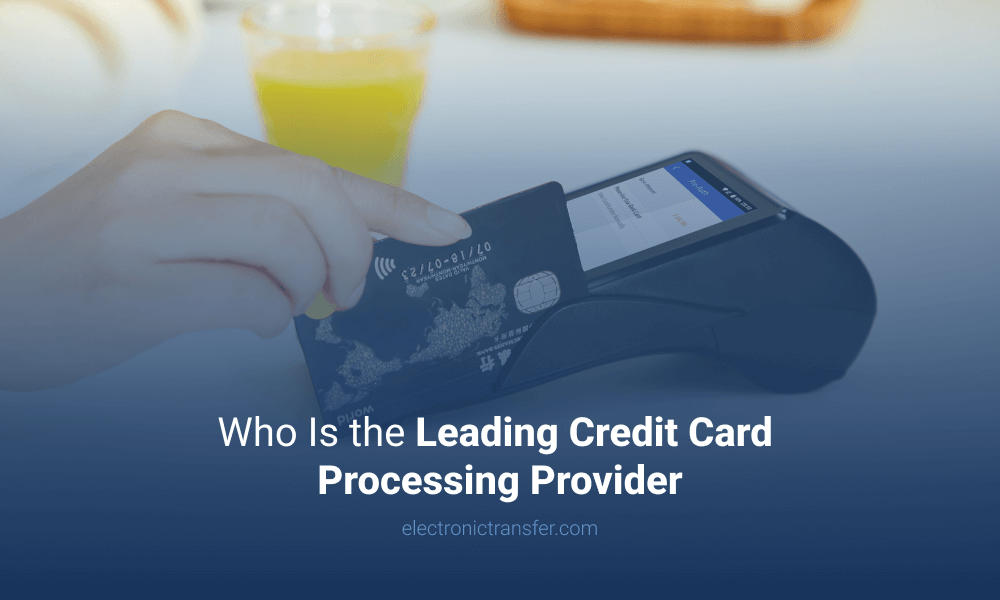Who Is the Leading Credit Card Processing Provider?

Today, shopping is easier than ever before. You just need to swipe your debit card and voilà, the purchase is made, and you are good to go.
However, there is a lot more happening behind the scenes. Credit card processors, for example, play a vital role in the transaction process, making life much simpler for everyone.
We will delve deeper into that later, but first, let’s start with the basics.
Credit Card Processing Provider: Explained
There are several entities involved in a transaction. Here is a quick overview of each:
- Merchant. The business that accepts the payment needs a credit card payment processor.
- Cardholder. The person who holds a credit/debit card that is used for the purchase of products/services.
- Acquiring Bank. The bank the business deals with (merchant).
- Issuing Bank. The bank the customer deals with (cardholder). Issuing banks pay acquiring banks for the purchases of their cardholders.
- Bank Card Association. Card associations include Visa, MasterCard, JCB, American Express, Discovery, etc. A bank card association, or just a card association, is an organization that arbitrates between banks and sets interchange rates. Keep in mind that these are not actual banks.
- Payment Processor. This is the company that processes payments made with credit, debit, or gift cards Essentially, they act as an intermediary between card associations and banks.
Credit card processing can be divided into three stages – authorization, settlement, and funding.
Authorization
The authorization stage is completed within seconds. It happens when the cardholder provides their payment information through the merchant’s card reading service (credit card terminal, mobile readers, tap-to-pay apps).
Then, this information goes to the card processor, and the transaction details head to the correct credit card association (MasterCard, Visa, etc.) and issuing bank. Finally, the merchant will either get a denial code, or the transaction will go through.
Keep in mind that all vendors take their fees from the customer, with the most significant amount going to credit card network accounts.
Settlement and Funding
This process typically takes one to three business days to be completed. It represents the movement of funds from the issuing bank to the account of the merchant. Before this happens, the issuing bank deducts interchange fees from the transaction amounts.
It should be noted that transactions are usually handled in batches at the end of each night. This provides the status codes from the day to the credit card payment processor, and the payment provider sends the final transaction data to the card associations and financial institutions.
Why Should You Use a Credit Card Processing Provider?
A lot of businesses and individual entrepreneurs start out by only accepting cash payments. However, according to Forbes Advisor, only 14% of people prefer cash payments over card purchases.
This means that your business will suffer if you only take cash. This is why you should have various payment methods that your customers can choose from.
Therefore, sooner or later, you need to start offering credit card payments, and that is the point when you will need the services of credit cards processing companies. Which brings us to our next point.
How to Choose the Best Credit Card Processor for Your Business?
- Business Type. Is your business considered high-risk? Industries, such as gambling, sports betting, travel and tour operators, and firearms manufacturers, to name a few, are often seen as high risk. If that is the case for your business, you definitely need to look for a high risk credit card processor that can cater to your individual needs.
- Customer Service. It is very important, for any company, to have a knowledgeable, reliable, and fast customer service available to assist their customers.
- Integrations. You need to determine which integrations, for example, Quickbooks, Zoho Books, Point-of-Sale (PoS) software, and so on, would work best for your business.
- Fees and Costs. You must consider the transaction, recurring, and one-off fees of the provider. While transaction fees are mandatory, and are set by credit card companies like Visa and MasterCard for the ability to use their services, the other two may vary, depending on the provider you pick. For instance, some providers make an additional profit by charging businesses non-mandatory merchant fees. You do not need to pay such fees, in order to accept credit card payments. The same goes for one-off fees, such as setup fees, address verification fees, and so on. So, always be on the lookout for such hidden fees and costs that may turn out to be quite hefty.
- Experience and Expertise. It is highly recommended to choose an established and authoritative credit card payment processor. After all, you wouldn’t want to leave your business in the hands of a new, unproven, company that may or may not turn out to be good.
Electronic Transfer – Leading Credit Card Processing Provider
Electronic Transfer is a leading credit card processing provider, with over 30 years of experience in the industry.
We are specialists in online payment processing, mobile payment systems, retail point of sale, and FFL payment processing, to name a few (you can check our full list of services here).
With us, there are no hidden fees, no cancellation fees, and no sign-up fees. We are your best bet when choosing a merchant account provider.
We also believe our clients come first and take pride in our exceptional customer service. Of course, don’t just take our word for it, take a look at our client reviews.


